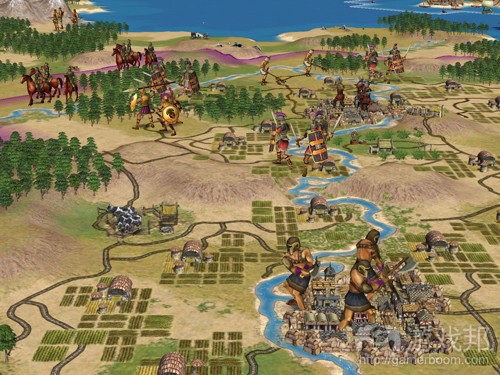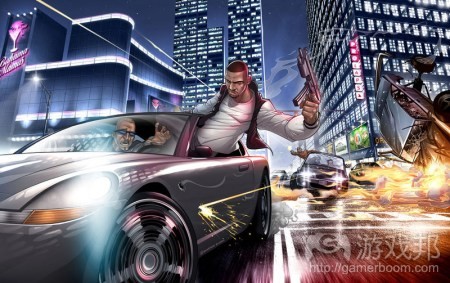游戏设计需重视游戏机制与主题的和谐
作者:Soren Johnson
正如我们在第一部分中说过的那样,游戏的内涵来源于其机制而不一定来源于主题,尤其是当这两种因素发生冲突时。这种不一致性可能会让玩家感到很失落,甚至觉得自己受到了欺骗。因而,设计师应该努力保证这两个要素的和谐。至少,它们之间不应当有冲突。
如果这两个因素之间发生冲突,那么游戏机制就会影响到设计师想要传达的主题。比如,《生化危机》为玩家呈现的是真正具有伦理性的选择,是要通过摧毁Little Sisters而“收获”她们,还是通过释放她们的思想来“解救”她们?收获的奖励是获得两倍的Adam(游戏邦注:这款游戏中的遗传更改货币),这就等于玩家选择了一条与道德相悖的道路。
但是,游戏也为那些解救Little Sisters的玩家提供了其他奖励,这样从统计学层面上来说,两种道路的选择并无不同。游戏故事告诉玩家他们要重视自己的选择,如果决定解救小女孩就要做出牺牲,但是游戏机制所阐述的是不同的事情。当然,当主题和机制发生冲突时,玩家自然知道哪个更为重要。
同样,许多传统RPG也会将玩家置于奇怪的境地中。游戏自开始时便给予玩家宏伟的目标(游戏邦注:比如杀死某个邪恶的巫师),这样游戏就将玩家视为世界的救星。但是,在真正的游戏中,玩家会游曳在乡村中杀死所有阻挡自己前进道路的东西,掠夺游戏目标之外的其他东西。故事告诉玩家他是个英雄,但是游戏会因玩家的其他行为而给予奖励。Richard Garriot在设计《Ultima IV》时直接对这种分裂性发起挑战,他将游戏制作成旨在让玩家培养8种长处,而不是简单地杀戮所有挡在前方的东西。
完美的统一
有时,设计师确实实现了主题和机制的完美统一。Dan Bunten的作品《Seven Cities of Gold》便是个范例,这是款经典的探索游戏。Bunten在欧扎克山脉徒步旅行时迷路了,由此想到了这款游戏的机制。以该机制为基础,Bunten更进一步,选择了一个完美的主题,即西班牙征服者横行的时代。
某些类别的游戏对主题和游戏玩法的搭配做得尤为出众,包括Wii游戏、音乐游戏、大亨游戏、运动游戏、战斗模拟游戏和竞速游戏。应该注意的是,尽管这些游戏基于现实世界中的行为构建而成(游戏邦注:这种做法有利于保持机制与主题的紧密结合),但是游戏设计师也可以不必过于强调逼真效果。
另外,某些主题与机制的结合可能产生游戏巨作。《Left 4 Dead》并非真正的僵尸游戏,毕竟游戏更多关注的是团队合作。设计师创造出各种各样的僵尸来鼓励玩家组成团队,例如猎人可以处罚独行者,坦克需要集中的火力,巫师需要近场沟通和交流等等。僵尸主题只是背景而已,设计师可以在此背景下尝试各种游戏机制并且鼓励团队合作而不是单打独斗。
《文明》的主题和内涵
《文明》系列游戏尝试将主题和内涵配对,这是个绝佳的研究范例。
首先,社会发展过程贯穿在整个游戏中,玩家的文明帝国不会进入黑暗时代或爆发内战。玩家只能获得迎战外部侵略的体验。
事实上,游戏也提供了“开始变革”这个选项,玩家可以在合适的时候改变政府。玩家在游戏中的位置很奇妙,扮演皇帝、平民、商业大亨和上帝多种角色。
正是由于玩家的介入才会导致游戏与真实历史的冲突。要获得乐趣,玩家就需要有控制游戏的权利。而且,每个决定的后果都必须公平清晰,这样玩家才可以作出选择,提前规划或者理解自己的不足之处。但真实的历史更为复杂并且难以理解,更不用说控制了。
玩家的介入确实是个很棒的事情,这也是让游戏如此强大的重点所在。可能某些问题已经超出了游戏机制所能管辖的范围,但是有时候游戏主题仅仅是主题而已,让玩家了解这种虚幻的空间就可以了,不要过多地干涉玩家做出的决定及其愿望。
在《文明》中,玩家的愿望是控制历史。事实上,这种设计使得这款游戏超过了其他艺术作品的价值。
那些真正想向我们讲述历史的设计师应该专注于某个特定的时代或事件,比如Bunten的《Seven Cities of Gold》和Meier的《铁路大亨》。它们让玩家有身临其境的感觉,让他们面临当时的挑战和机遇。
主题的影响力
虽然游戏的主题和机制可能讲述着不同的故事,但是社会大众基本上不理解这两者之间的差异。如果游戏主题不为大众所接受,那么优秀的游戏就可能会遭到埋没。比如,《侠盗猎车手》(游戏邦注:下文简称GTA)的主题是犯罪和城市混乱,但是游戏真正的内涵是自由及其后果。每次犯罪都会增加玩家的恶名,最终结束游戏的可能是警察强大的火力。
但是,对主流大众来说,GTA所展示的只是杀死路人等犯罪行为。对外人来说,游戏的内涵就是这样的。但是,玩家能够理解游戏给他们提供的是与主题不同的内容,这是个他们的决定能够发挥作用的开放世界。
《Crackdown》提供的也是个开放性的模拟世界,但是所使用的主题比起GTA来说更贴合主流思想。Rockstar或许已经用销售记录向世界展示了他们开发游戏的实力,但是那些自认为必须要有社会责任感的设计师注意到的是开放游戏并不一定要使用犯罪主题。
今天,许多设计师努力实现两个有价值的目标——接触大众玩家并创造优秀的艺术效果。但是,如果主题和机制不一致的话,这两个目标都有可能无法实现。那些对游戏设计了解不多的用户希望游戏能够展示像盒子封面那样的内容。如果处理不当,只会让新玩家黯然离开游戏。
对于艺术性这个问题,设计师必须首先意识到,许多绝佳的艺术作品都是抽象的。歌词或许可以让歌曲有一定的内涵,但是听众们可能更喜欢较为抽象的交响乐。同样,游戏也可以脱离主题而独立存在,《俄罗斯方块》便是绝佳的例证。
而且,有时游戏的主题并不一定要十分清晰,比如《San Juan》和《Race for the Galaxy》。前者的背景是加勒比地区,而后者的场景在外太空。这根本无关紧要,因为它们并非以模拟为卖点。它们的主题只是为了增添韵味而已。
但是,优秀的艺术作品绝不会出现公开冲突的主题和内涵。《Othello》主要讲述的是“绿眼怪物”的妒忌心,不只是为了呈现16世纪威尼斯军队中某个摩尔人的生活,但是后者与前者并没有冲突。所以,如果要吸引用户,那么游戏本身的机制就应该同主题保持一致。
游戏邦注:本文发稿于2010年6月16日,所涉时间、事件和数据均以此为准。(本文为游戏邦/gamerboom.com编译,如需转载请联系:游戏邦)
Game Developer Column 11: Theme is Not Meaning (Part I)
Soren Johnson
As examined in Part I, a game’s meaning springs from its mechanics and not necessarily from its theme, especially if the two are in conflict. Such a dissonance can leave players feeling lost, perhaps even cheated. Thus, designers should strive to keep the two in harmony. At the very least, they should not be fighting each other.
When they do, the game’s mechanics can actually undermine the theme that the designers want to deliver. For example, Bioshock presents players with a true ethical choice – “harvest” Little Sisters by destroying them or “rescue” them by releasing their minds? The reward for harvesting is double Adam (the game’s genetic-modification currency), which tempts players to choose a morally disturbing path.
However, the game sprinkles other rewards on players who rescue Little Sisters, so that the ultimate difference between the two paths is negligible from a statistical perspective. Players are told by the game’s fiction that their choice matters – that they are making a sacrifice by deciding to rescue the little girls – but the game’s mechanics tell them a different story. Of course, when theme and mechanics are in conflict, players know which one actually matters, which one is actually telling them what the game is about.
Similarly, many traditional RPG’s put the player in an odd position. By giving the player an epic goal from the beginning (“Kill the evil wizard!”), the game casts him in the role of the world‘s savior. However, the actual gameplay involves roaming the countryside killing most of what falls in the player’s path and looting everything else. The story tells the player that he is a hero, but the game rewards him for being something else. Richard Garriot directly attacked this dissonance when he designed Ultima IV, by making the game about achieving eight virtues instead of simply killing his way to a “Foozle” at the end.
A Perfect Union
Sometimes, a designer does achieve a perfect union of theme and mechanics. One example is Dan Bunten’s Seven Cities of Gold, the classic game of exploration. Bunten lost his way one day while hiking in the Ozarks and imagined a game in which the player struggles to keep her bearings in an unfamiliar landscape. From that seed, Bunten took the next step and chose a perfect theme – the age of the conquistadors, of Columbus, Cortez, and Pizarro, who were always partially lost – which provided wonderful raw background material with which to work.
Certain categories match theme and gameplay particularly well, including Wii games (Wii Sports), music games (Rock Band), tycoon games (Railroad Tycoon), sports games (Madden), flight sims (Wings), and racing games (Gran Turismo). Notice that while these examples are based on real-world activities, which helps to keep the mechanics tied to the theme, a designer does not need to put verisimilitude above all else.
In fact, one could argue that Mario Kart is more truly about racing than Gran Turismo is – the former’s rapid exchange of player position as shells fly around the track is perhaps closer to many players’ ideal concept of racing than a stodgy simulation’s more fixed positioning. Put another way, which object is more about Guernica – a photograph of the city’s ruins or Picasso’s masterpiece of anguish?
Further, great games can emerge when the theme simply provides an excuse to experiment with certain mechanics. Left 4 Dead is not really a game about zombies, after all – it’s a game about teamwork. The designers created each special zombies to encourage players to work together as a team – the hunter punishes loners, the tank requires concentrated fire, the witch demands close communication, and so on. The zombie theme simply gave the designers a plausible backdrop in which they could experiment with game mechanics that encouraged teamwork over solo play.
Does Civilization Fail?
The Civilization series provides an interesting study in the challenges inherent in trying to match theme with meaning. The games are purportedly about the sweep of world history, but one does not have to play long before cracks start to show.
To begin, societal progress is constant throughout the game – the player’s civilization can never fall into a dark age or split apart in a civil war. The user community has dubbed this dynamic the “Eternal China Syndrome.” The only entropy a player experiences comes from external invasion.
Indeed, the game actually provides a “Start a Revolution” button, so that the player can change government but only when convenient. (I’m sure Louis XVI would have appreciated such a system!) Indeed, all actions in the game are conducted top-down – the player is some strange combination of king, general, tycoon, and god.
The source of these conflicts with real history is the problem of player agency. In order to be fun, the player needs to be in control. Moreover, the consequence of each decision needs to be fair and clear, so that players can make informed choices, plan ahead, and understand their mistakes. Real history, of course, is much messier and difficult to understand, let alone control.
In fact, the game’s mechanics tell us less about world history than they do about what it would be like to be part of a league of ancient gods, who pit their subjects against each other for fun. These immortal opponents, after all, are the only characters that can destroy the player. The people themselves have little say in how history will develop.
However, player agency is actually a good thing; indeed, it is at the very center of what makes games so powerful. Perhaps some topics are simply too broad or vague or slippery to be addressed by a game’s mechanics, and – sometimes – themes can just be themes, with the player knowingly entering a fantasy space that speaks not directly to the topic but to some other need or desire.
In the case of Civilization, the desire is to control history, which may not teach us much about it, but it is not without value. Indeed, the game fares well when compared with other artistic disciplines. Few works of art tackle the sweep of world history, and the ones that exist (Birth of a Nation) are often dangerous works of ideology.
Designers who care to make games that actually speak to us about history should focus on a specific era or event, such as Bunten’s Seven Cities of Gold or Meier’s Railroad Tycoon. Put the player in the shoes of a flesh-and-blood person – let her explore the challenges and opportunities of the times but within mortal limits.
Why Theme Matters
Although a game’s theme and mechanics can tell different stories, society at large does not understand that there is a difference between the two, and if the theme is appalling to the mainstream, a good game can be unfairly tarred. For example, Grand Theft Auto has a theme of crime and urban chaos, but the game is actually about freedom and consequence. Every crime increases the player’s notoriety, which can end the game if the police send enough firepower.
Nonetheless, to the mainstream, GTA was simply about killing hookers and running over pedestrians – for outsiders, the game couldn’t be “about” anything else. Players, however, understood that the game was giving them something different – an open-world in which their decisions actually mattered. Consequence was the true killer feature.
Crackdown provides an interesting contrast in that it delivers the same open-world simulation with consequence as GTA but with a theme (fighting crime as a super-cop) much more palatable to the average person. Rockstar may have record sales to show for their work, but designers who believe they have a responsibility to society at large should take note that the criminal theme was not inevitable.
Today, many designers strive to achieve two worthy goals – reaching a mass audience and creating great art. However, both are at risk if theme and mechanics are in dissonance. The average consumer, who is not highly literate in the standard tropes of game design, expects video games to be about whatever is on the cover. Pulling a bait-and-switch – or simply not thinking critically about the lessons that a game actually teaches – will only turn new players away.
As for the question of art, one must first recognize that many great works of art are abstract. Lyrics may give some meaning to a song, but a symphony is generally meant to be interpreted and enjoyed however the listener prefers. Similarly, games can stand on their own without specific themes – Tetris being the obvious example.
Furthermore, even a pasted-on theme can work if the designers are not promising more than the game can deliver – San Juan and Race for the Galaxy are both brilliant, yet similar, card-based adaptations of Puerto Rico. That one is set in the Caribbean and the other in outer space is not a problem as the games are clearly not marketed as re-creations or simulations. The theme simply adds flavor.
However, great art never has theme and meaning in open conflict, in the way many games do. Othello is actually about the “green-eyed monster” of jealousy and not just the life of a Moor in the 16th-century Venetian military, but the latter does not detract from the former. Can the same be said about Bioshock? About Spore? About Civilization? These games do claim to be about something – do their mechanics tell the same story? To touch people, the play itself needs to deliver on the theme’s promise. (Source: DESIGNER NOTES)











































 闽公网安备35020302001549号
闽公网安备35020302001549号